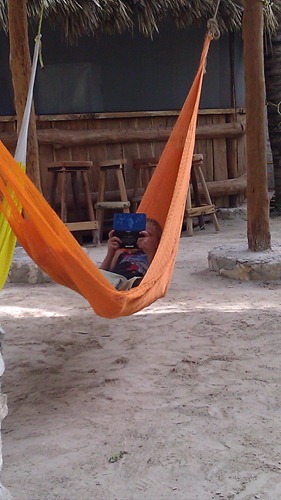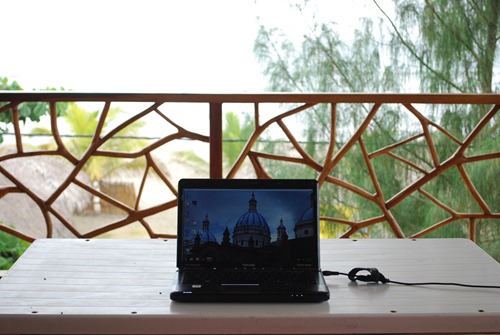When I wrote about how I have funded our indefinite travels, I mentioned working as a medical transcriptionist (MT). Naturally, many people have written me for recommendations or asked about working as an MT. Probably the most common comment is “I can type really well.”
If only it was that easy.
I decided it would be a good idea to write more about working as a medical transcriptionist.
What is it?
Physicians and other medical providers often dictate (a voice recording, usually digital) information about a visit, their findings on an exam, their treatment plan, etc. They send that dictation to an MT who transcribes it into a coherent document. However, it isn’t just about typing and correcting their grammar. It requires a knowledge of not only medical terminology but pharmacology, anatomy, physiology, and so much more.
Being a good typist is just a small part of the whole wider picture.
An MT is producing a medically & legally important document. There have been lawsuits based on transcription errors, including a successful $140 million wrongful death lawsuit that hinged on an error that led to the administration of a lethal dose of insulin to a patient.
An MT doesn’t “just type.”
Examples of headaches
Dictated: “The patient was given 100,000 units of heparin.” While transcribing this, the MT should know that giving 100K units of heparin, especially during an operation, could be lethal. This needs to be flagged for the dictator to review (he meant to say 10,000 units).
Dictated: “The perineal nerve was exposed [during a knee operation].” The MT is expected to know that one would not encounter the perineal nerve during a knee surgery. The physician meant to say “peroneal.”
Dictated: “She is to take Keflex 500 mg…” Normally, this would be just fine; however, earlier in the document it was listed that the patient is allergic to cephalosporins. Keflex is in this class, so it would need to be flagged for review.
These are just some of the issues. Medical transcription is a highly specialized form of technical writing.
Pay
Typically, an MT will be paid by production. This means that she will earn a certain rate for every 65-character line she produces. Lately it isn’t uncommon to find MTs who are making 6-7 cents per line. Depending on how productive you are while also maintaining a high level of quality, you could be earning less than minimum wage. At my last company, I was averaging about $16/hour working part time. However, that was clinic work which is a lot less complicated.
Dealing with ESL dictators (people whose native language is something other than English) adds an extra special twist to things, although I’ve had native English speakers who mumbled or mispronounced things so badly that I wanted to rip my hair out.
As much of the MT industry has gone to voice recognition (VR) systems, many MTs find themselves working as editors. Dictation is run through VR and sent to an MT who listens to the original dictation while reviewing the VR document. There are always changes needed as VR is nowhere near perfect. These types of MTs are often looking at about 3 cents per line.
While theoretically this type of document is quicker to go through, most of the MTs I know doing this type of work find they are not making as much as they do when they are doing actual transcription.
Before radiology transcription got swept up by VR, I could easily produce enough to average around $30/hour. They tend to use a lot of the same phrasing over and over, so with an expander program I could type only a few characters and get an entire report that only required small changes.
Those were the days.
Working as an MT while being a digital nomad
At a minimum, you’ll need a laptop or netbook, a foot pedal, special software (usually supplied by the company you’re working with), and a headset. I kept my foot pedal in my daypack when we traveled to reduce the likelihood of it getting lost. Without a foot pedal, you’ll have to press keys on the keyboard to start, stop, pause, etc., and that can really reduce your production. Cut your production, and you cut your pay.
It isn’t always easy to find a place that is quiet enough for you to listen to and hear the dictation, especially if you get a whisperer or a mumbler.
You will need reliable Internet. In Morocco, I had a challenge since our only connection was via a 3G dongle. Usually it wasn’t too bad since the software makes sure you have 3 dictations at a time. I would get my coffee brewing, etc., while downloading the first three jobs. You can work on the next job while it’s taking its sweet time uploading the finished one, so usually there weren’t major kinks.
However, there were times when the dictations were so short that I finished all three while waiting for the first one to finish sending.
Sometimes WiFi can cost quite a bit. Having to pay for broadband or an Internet connection, will cut into your earnings as well. And occasionally you just can’t get a connection.
The other potential bummer is if you are outside the US and experience problems with your foot pedal or computer. Getting a replacement shipped to you could cost a pretty penny. When we were in Australia, a friend express mailed me my new debit card. That cost me around $60. For just an envelope and a fairly weightless card!
While many companies offer a flexible window for you to work within, some need work turned around more quickly or may require you to work between certain hours. If you’ve established you’ll be working a particular schedule that was nice and doable at home, you may find yourself waking up at 2 AM to begin work while traveling.
Future of the industry
MT work is slowly disappearing thanks to international outsourcing, voice recognition, and electronic medical record systems that are “point and click.” It’s tough for me to recommend people invest the time to get the training required to be able to acquire employment in this field because of this.
However, if someone is looking for part-time location-independent work, this could be something that works out well. I think VR will continue to take away jobs, especially clinical and some specialty transcription, but at the same time editors will likely be needed for a long time.
If it isn’t your main source of income, MT could enable you to travel and pretty much live anywhere you want as long as you have electricity and an Internet connection.
How to get started
If you don’t have a lot of medical background, you’ll probably need to go through a medical transcription course first. In the past, some companies offered an on-the-job training situation, but those are pretty rare these days. There are lots of online courses, but I think the one with the best reputation is Andrews School. I don’t know much about them, but I’ve read good things from many people.
Some community colleges and adult education programs offer training as well, so make sure to check local resources.
Do you have any questions about using medical transcription to enable a life as a digital nomad?








March 20, 2019
Anyone have suggestions for a good MT company that employs abroad and pays decently? I’m a Canadian living in Italy and a recent high honors MT graduate. Thanks so much!!
March 21, 2019
I don’t know of any companies hiring Canadians. I’m a bit jealous of you living in Italy, though. 😉
May 23, 2017
I am currently finishing a 650 hours MTE course online so I can have some sort of income when I live in mexico during winters. I studied last year about 25 hours per week and had no problem with WiFi or any connectivity. I am rounding the corner and find I do well with cardiology and of course PT, ortho, and chiropractic as I am a sports ortho medical massage therapist of some 12 years so the A&P is a snap the pharmacology and doses is not my fortay so hoping when I finish to find sport medicine clinics, PT and I do like cardiology and surgery notes.. call me crazy but those words are easy on my ears.. go figure. I agree it is way more than typing and with all of my medical background, 5 years as an ER unit clerk and 12 years as a sports massage therapist, I have to retrain my listening skills. But now, I type as fast as they speak simultaneously.. progress is production and accuracy is the name of the game.
Salud
April 11, 2017
Hi Talon! Do you have any clue where I can find a foot pedal in Thailand? I’m currently in Chiang Mai and looking into entry-level transcription for some extra cash.
April 11, 2017
I can’t even begin to imagine where you could find one there. 🙁
December 26, 2016
Not sure if you’re still around Talon but I’d love to know what company you work for that allows you to work out of the country. I’m Canadian and have been an MT for over 10 years but I can’t find any companies who will let us work outside of Canada. I would love any info you could provide.
Hope you’re still having adventures!!
December 26, 2016
We never discussed I was traveling long-term. They knew I was out of the country sometimes, but I’m not sure they knew to what extent.
April 3, 2018
I would add that the laws of Canada do not allow the documents you will transcribe to be overseas, perhaps it is rare in the US but in the US the companies hiring you make that call on a case by case basis. This is what I read on another site written by a Canadian.
April 4, 2018
It isn’t rare in the US. MANY companies are actually sending their dictation overseas to India and the Philippines to be transcribed, and they pay US MTs to act as editors to correct it. Very unfortunate just how loose it can be really. Typically, for US companies, though, as long as you’re software is encrypted and/or you’re using a VPN it isn’t an issue. Especially if the software doesn’t leave the finished document on your computer.
October 4, 2016
I just came across this as I am currently a MTE student! My goal is to be able to do this while I travel so I am so happy to have found this! But looks like I will have to have a lot of money saved before hand as this doesn’t seem to be a large income? Not sure if it’s changed but in canada the average is about $20-$27/hour, definitely do able! I’m
So excited to start.
October 5, 2016
That’s a pretty good wage. Very few MTs make that kind of money in the US now. I know of many who aren’t even making minimum wage, which is around $7 USD per hour. A lot depends on if you’re doing VR editing or straight transcription. The latter pays much better.
October 7, 2016
I’m taking medical transcription and editing, so I’m hoping I can find a job doing both. I am so excited to be able to travel while working, but it sounds pretty difficult to make a living wage, minimum wage in Canada is $12/hour which still isn’t liveable, but I guess we will have to see how it goes!!
October 7, 2016
Traveling is mostly cheaper than staying at home, so it might work out for you depending on your travel style, where you go, etc.
December 26, 2014
Hi Talon, I first visited your site a while ago but not for a long time. Since my last visit I’ve actually gotten qualified as an MT and have now been working for a few months. I’m Australian and my company is actually growing – not sure why that is, we only accept Australian work (not from any other countries) so I’m not sure why it’s growing here and not in the US.
Fingers crossed we’ll be getting on the road soon so although I don’t earn a lot doing this it should be enough to support our travels. I definitely don’t think I’d be able to do this while staying in a hostel though. I’d be too worried about preserving the security of the data I’m privy to. I think this is definitely something for housesitting or Airbnb places. 🙂
Anyway, it’s always nice to connect with another MT.
December 26, 2014
Nice to hear your company is growing! The field is continuing a downward spiral in the US which is quite a shame.
November 10, 2014
Hi Talon – I just found this post although I have been following you on Facebook for a few months. I have been an MT for years, currently working at home and occasionally house/dog sitting for friends. My boyfriend and I were just discussing this weekend if it would be possible for me to work in Mexico a few months of the year. What did you do for an internet connection most of the time? What did you do for a desk/chair setup? I would appreciate any advice.
November 12, 2014
Every place we stayed had free WiFi, so that made it really easy. I didn’t get to have a nice desk/chair setup. Often, I was sitting on a couch or bench. If I had to work full time like that, it would probably be a challenge. You definitely won’t find it easy to have an ergonomically appropriate setup.
November 13, 2014
Thank you for replying. Luckily with more editing and less transcribing, ergonomic is not totally required, comfort is though. I did work on a bench table in a small camper for over a year. I have found that wooden TV trays worked well when I was house sitting. If we do this we will be driving a van with lots of storage for a chair. My greatest concern was the wifi. It sounds very doable though. Thanks again,
November 16, 2014
WiFi is usually pretty easy to find. There is also the option of MiFi.
October 5, 2014
Talon, knowing that you were a medical transcriptionist I have wondered if you were able to fund your travels with transcription. I figured there must be occasional problems with internet access, equipment issues etc. It was nice to read about your experiences as a transcriptionist in this post. Kathy (Also a transcriptionist but based in a hospital.)
October 7, 2014
For the most part it’s been pretty easy. My biggest challenge was usually noise since we were staying in a lot of hostels, and the younger crowd really like noise.
October 2, 2014
Thanks Talon. I’m a theatre nurse & without actually nursing as we travel was at a bit of a loss as to how I would make money whilst mobile. Definitely an option to consider. I feel the world beckoning.
October 4, 2014
It could definitely be something helpful to you.
October 2, 2014
Very fascinating Talon – and FAR TOO MUCH PRESSURE for me, I’d be always so worried about what I typed. I’ll leave the job to you.
October 4, 2014
It is definitely a big responsibility. Some people think MTs just type, and it scrapes our nerves every time. 😉
October 1, 2014
I think you lead a triple or quadruple life! Who knows what you will be telling us next. Interesting to see that technology is getting closer to making this job obsolete.
October 2, 2014
Only to people who don’t read the blog. People who read my post about how I fund our travels already knew about me being a medical transcriptionist. 😛
September 17, 2016
As an MT for over 30 years, I have worked in hospitals, clinics, private doctors MT companies at home and at their office and my own home based business. Currently I am working at my home based business. I am keeping it small as I am 61 and don’t need a full time income. I have no problem with the amount of work I get, particularly, I think because I was lucky to have two doctors who have the new electronic medical record system, but are adverse to doing it in front of their patients, losing that face to face time with their patients. They find it more beneficial to their practice to pay me. For one cardiologist, I do his transcription and send them the reports but I also enter it into their system, which gives me extra pay.
The other doctor, I worked for for many years as a executive assistant and word got in the building that I was doing work at home now and thus got the cardiologist’s work. I must point out that both of these physicians outsourced to India at one point and brought it back home within a year.
So, just wanted to let people know that there are physicians who can still use your service. I happened to mention what I do to a new physician the other day, at my first visit, and he seemed very interested as he did not have the ability to look at me during a lot of the interview.
I thoroughly agree with Talon’s take on how other people perceive the job- ” I can type”. I almost feel insulted when people of obvious intelligence think anyone can do it and want leads so they can do it for a few months while they go back to school or travel.
September 18, 2016
It’s almost like telling a construction worker and/or architect you can do their job because you can hammer a nail. It gets frustrating.
Nice to hear you’re still finding clinic clients. One of my friends does all his through Dragon Voice. I can’t help but think using an MT would still be faster and better quality.
October 1, 2014
Are there any HIPAA requirements that you be Inside the US (Even if you are on the road)?
Do you VPN to download/upload your work?
Do you need use VPN in to look like you are in us?
October 2, 2014
One of HIPAA’s big fails was not addressing medical documentation when it leaves the country. This was a significant concern for those of us in the field who saw medical records with personal identifying information leaving the US.
Most of the programs provide encryption between the MT’s device and the company’s server. However, sometimes a VPN is required to protect data. It isn’t required to appear like you’re in the US, however, especially since HIPAA doesn’t address that area.
October 1, 2014
Interesting Talon. It is like all this time I have known you and you have been living a double life. haha holding out on a very interesting location independent job. I had no idea this existed – lesson for the day learned.
Turner
October 2, 2014
Guess you just need to read my blog more often or else you would’ve known. 😀